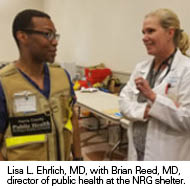
Hurricane Harvey has been a disaster for the Houston area by any definition, but the medical response at major shelters has been anything but.
Lisa L. Ehrlich, MD, is codirector of medical operations at Houston’s NRG Stadium shelter and president of the Harris County Medical Society. She volunteered in the wake of previous hurricanes, including Andrew and Katrina.
Dr. Ehrlich, who has earned the nickname “Power Ponytail,” has run the NRG shelter with emergency physicians Beau Briese, MD, and Aaron Schwartz, MD. Numerous volunteers did a great job of screening people as they entered, Dr. Ehrlich told the Texas Medical Association late last week.
 Anyone older than 70 or younger than 1 was automatically evaluated by the medical team.
Anyone older than 70 or younger than 1 was automatically evaluated by the medical team.
Many of the people in the shelter were homeless, so physicians also screened aggressively for tuberculosis patients and those with behavioral problems, she said.
In both cases, patients tend to underreport their illnesses, so after the shelter staff asked, “Do you have any medical problem?” they would follow up with a second question.
“[The patients would] say, ‘I don’t have any medical problems,’ and we’d [follow up and] say, ‘How long’s it been since you had your medicine?’ ‘It’s been five days,’ ” Dr. Ehrlich said. “We caught a lot of people who needed care that way.”
Physicians also walked among shelter residents to look for signs of drug withdrawal or psychological problems.
“We kind of routed those out early,” she said.
As of late last week, the shelter has seen a variety of predictable illnesses, including type A flu, scabies, bed bug bites, and conjunctivitis, Dr. Ehrlich said. All of those ailments are under much better control than they were in the wake of Hurricane Katrina, Dr. Ehrlich said.
“It’s a totally different place,” she said. “We’re actually isolating people with medical problems.”
During Katrina, people sheltered at the old Astrodome had so many different medical conditions that doctors put the well people — not the sick people — in medical isolation, Dr. Ehrlich said.
“We had a small number of healthy people, and there was just so much pestilence,” she said. “It was the inverse of how it should be if you’re running a shelter.”
The greatest long-term medical problem facing the Houston area after Harvey will be treating behavioral disorders. Like the rest of the country, Houston already has a shortage of psychiatrists.
“Now we have an overwhelming number of people in need, and we’re in a huge stress situation, so things like anxiety disorders, depression, schizophrenia, and other mental needs are going to be higher when we already don’t have enough psychiatrists in the first place,” she said. “And now they have a backlog to just see their own patients because they’ve been displaced and shut down for two weeks. … We already weren’t great to begin with, and [Hurricane Harvey is] going to just put huge stress on the system.”
Action Special, Sept. 11, 2017